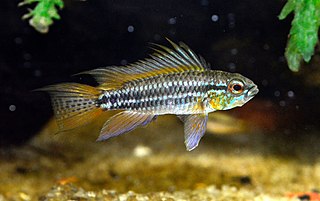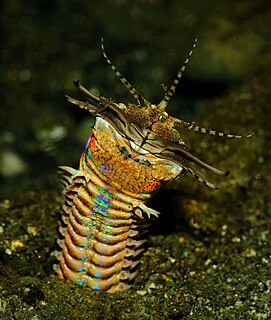
Nereis is a genus of polychaete worms in the family Nereididae. It comprises many species, most of which are marine. Nereis possess setae and parapodia for locomotion and gas exchange. They may have two types of setae, which are found on the parapodia. Acicular setae provide support. Locomotor setae are for crawling, and are the bristles that are visible on the exterior of the Polychaeta. They are cylindrical in shape, found not only in sandy areas, and they are adapted to burrow. They often cling to seagrass (posidonia) or other grass on rocks and sometimes gather in large groups.

Apistogramma is a large genus of freshwater fish in the family Cichlidae found in South America, but also commonly kept in aquariums. They are dwarf cichlids that mostly feed on tiny animals and have breeding behaviors that vary depending on the exact species.

The Venezuela national basketball team is organized and run by the Venezuelan Basketball Federation (FVB). They won the 2015 FIBA AmeriCup.

Gabriel Salazar Vergara is a Chilean historian. He is known in his country for his study of social history and interpretations of social movements, particularly the recent student protests of 2006 and 2011–12.

The China women's national volleyball team represents the People's Republic of China in international volleyball competitions and friendly matches governed by Chinese Volleyball Association. They are one of the leading and most successful squads in women's international volleyball, having won ten championships titles in the three major international competitions of volleyball, including five World Cups, two World Championships and three Olympic titles. The current head coach is Cai Bin.

Eunice is a genus in the polychaete family Eunicidae. Individuals grow to a length of between 0.5 and 300 cm. Their bodies have multiple segments. They have two eyes and five tentacles. They have well-developed sense organs and relatively large brains. Their color is dark purple-brown to red-brown with a white ring at the fourth segment. They are found in oceans and seas around the world. They have an evertible proboscis with distinctive mouthparts, some of which comprise two rows of maxilliary plates in a radula-like fashion.

The Meruliaceae are a family of fungi in the order Polyporales. According to a 2008 estimate, the family contains 47 genera and 420 species. As of April 2018, Index Fungorum accepts 645 species in the family.

Serhiy Viktorovych Zhadan is a Ukrainian poet, novelist, essayist, and translator.

Camila Antonia Amaranta Vallejo Dowling is a Chilean communist politician and former student leader who has been serving as Minister General Secretariat of Government since 11 March 2022. Previously, Vallejo served as a member of the Chamber of Deputies, representing District 26 of La Florida, Santiago.

Thoracopteridae is an extinct family of prehistoric bony fish; classified with the order Peltopleuriformes. This lineage of Triassic flying fish-like Perleidiformes converted their pectoral and pelvic fins into broad wings very similar to those of their modern counterparts. However, this group is not related to modern flying fish from the family Exocoetidae, instead being a case of convergent evolution.

The Vallejo Admirals were an independent professional baseball team based in Vallejo, California. They were members of the Pacific Association of Professional Baseball Clubs, which was not associated with Major League Baseball. In 2017, the Admirals won the Pacific Association championship.
Sternaspidae, commonly known as mud owls, are a family of marine polychaete worms with short swollen bodies. They have a global distribution and live buried in soft sediment at depths varying from the intertidal zone to 4,400 m (14,400 ft).

Sternaspis scutata is a species of marine polychaete worm in the family Sternaspidae. It occurs in the Mediterranean Sea and the temperate northeastern Atlantic Ocean. It lives submerged in mud or other soft sediment.

Siphonostomites hesionoides is a species of polychaete annelid known only from subtidal lagoon deposits from the Early Eocene of Monte Bolca, Verona, Italy.

Coenogonium is a genus of crustose lichens in the monotypic family Coenogoniaceae. It has about 90 species. Most species are leaf-dwelling or grow on bark, although a few are known to grow on rocks under certain conditions, and some are restricted to growth on termite nests. The genus was circumscribed in 1820 by German naturalist Christian Gottfried Ehrenberg.
Scolelepis is a genus of annelids belonging to the family Spionidae.
Brada is a genus of polychaetes belonging to the family Flabelligeridae.
Linopherus is a genus of polychaetes belonging to the family Amphinomidae.













